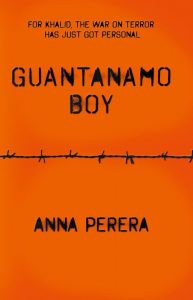
Guantanamo Boy
Written by Anna Perera
Puffin, 2009, 340 pp.
ISBN-13: 097-0-141-32607-8
Hurt is hurt. Harm is harm. Bullying is bullying. What everyone wants is the same thing-kindness. I’d like to see more kindness when I get out of here, because I’m sick of hearing about bombs and seeing pictures of people dying and terrorists doing this and that. I’m just a kid who wants to get A-levels and go to uni and make something of himself. (p. 326)
Khalid is a typical fifteen-year-old living in Rochdale in the North of England. He is into football (soccer), playing video games, and an artistic Irish girl. While his mother is from Turkey and his father is from Pakistan, the family is only moderately observant Muslim and Khalid is removed from what is happening in the greater world politically. This changes when he goes to Pakistan with his family during the school’s Easter holidays. Khalid is captured as an “Enemy Combatant” and, while being water-boarded by military/government officials, confesses to crimes he never committed. For the next two years Khalid is moved and detained in Pakistan, Afghanistan, and, finally, Guantanamo Bay, Cuba.
The novel describes the physical, emotional, and spiritual torture Khalid endures as he lives day-to-day remembering snippets of his past “normal” life in England to keep himself from going completely crazy. He is eventually released and the story ends with him trying to figure out how to live after such a tragedy. Khalid is caught in the conflict between the West and Islam. He embodies the dissonance between what is often considered Western and Islamic thought as he is both an average kid in England and a Muslim from an immigrant background. He is held for two years as a terrorist because he innocently plays a video game that the CIA believes is a meeting place for an Al Qaida cell. Khalid does not reach resolution by the end of the novel, as he must try to make sense of senseless violence and hatred.
As a reviewer, I am concerned with the authenticity of this novel. The author has been quoted as saying that she did not interview any child detainee at Guantanamo and that this narrative is just a novel. My research indicates that children have been detained by the US in Guantanamo, as well as at other secret locations, but that does not resolve questions about the author’s familiarity with either of the cultures she represents or the novel’s settings. More concerning, however, is the black and white binary representations in her story. Khalid is so normal. No one he encounters is an actual terrorist. The detainees are the good guys while the British and American governments are the bad guys. This binary compromises what could have been a powerful story about morality and ethics of an impossible situation.
Anna Perera was inspired to write this novel after she attended a talk given by a human rights lawyer. She is English and, prior to writing, worked as a teacher. This novel was shortlisted for The Costa Children’s Book Award in 2006 and is in currently being made into a movie.
Melissa B. Wilson, Leeds Trinity University, Leeds, UK
WOW Review, Volume IX, Issue 2 by Worlds of Words is licensed under a Creative Commons Attribution-NonCommercial-ShareAlike 4.0 International License. Based on work at https://wowlit.org/on-line-publications/review/ix-2/
